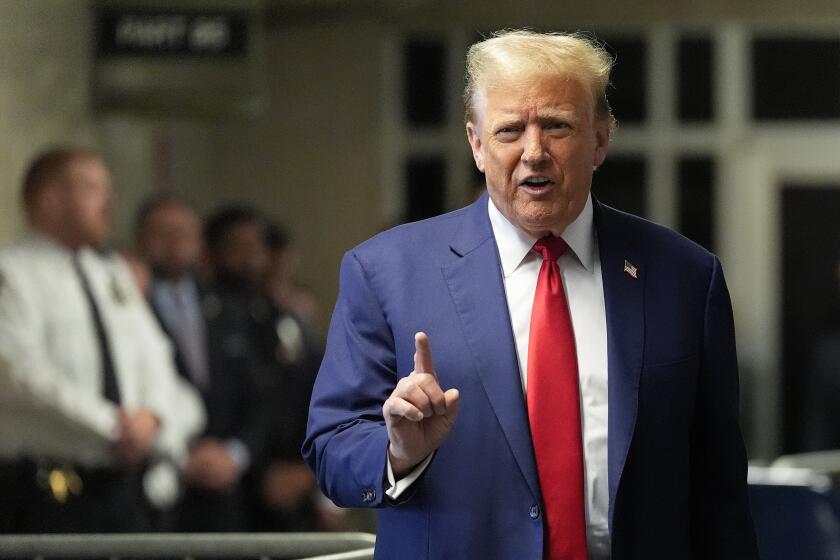Nader Has Qualified Nowhere, Plans to Everywhere
His first try at qualifying for the ballot in a key state fell short. Nor is he yet certified anywhere else.
But Ralph Nader, the independent candidate many Democrats revile as a spoiler, claims steady progress in his quest to put his name in contention for the presidency in every state. He is starting his own party, the Populists; rebuilding once-frayed ties to the party that nominated him four years ago, the Greens; and even working with remnants of the Reform Party founded by Ross Perot.
The Reform Party, which espouses fiscal discipline and clean government, nominated conservative commentator Pat Buchanan in 2000. Now Nader, an anti-corporate crusader well to the left of Buchanan, could become its standard-bearer.
“We have a terrific bond with Ralph,” said Shawn O’Hara of Mississippi, the Reform chairman. In an interview last week, O’Hara predicted that the party would soon give Nader its endorsement -- and, if he wants it, access to ballot lines in a handful of states, including Florida.
Although the party’s strength has ebbed significantly, Nader has indicated he would welcome its embrace. “If individuals in the Reform Party want to work with our campaign as part of the broad independent coalition that is developing, we would be pleased and would welcome the opportunity,” he wrote in a letter to the party last week.
Such developments show that Nader is likely to find a way onto the ballot in many states, whether through his own petition drives or strategic alliances with other movements. That prospect infuriates and worries many Democrats who believe his candidacy tipped the 2000 election to George W. Bush and could do so again this year.
Yet Nader still faces steep obstacles. This month, he failed to muster 1,000 registered voters to a meeting in Oregon to qualify for the ballot there. And Democrats who support Sen. John F. Kerry of Massachusetts, their presumptive nominee, are scrutinizing Nader’s moves closely and can be expected to challenge his efforts at ballot access.
Nader’s campaign acknowledged Friday that he has not yet qualified for the ballot anywhere nearly two months after he announced his run Feb. 22. The first deadline for turning in petitions comes in Texas in May, said Richard Winger, a San Francisco-based authority on ballot access laws.
Though Nader is virtually assured of getting on the ballot in some states -- Louisiana and Colorado require only a $500 fee -- he is racing to collect hundreds of thousands of signatures in states that have far more stringent requirements.
In an interview, Nader denounced the qualifying rules for independent candidates as “deviously complex and obstructive.... All this should be declared unconstitutional.”
Third parties have long struggled to get onto presidential ballots. Even when they do qualify in a given state, they often have to start again four years later. “The entire system was set up to render third parties illegitimate,” said Lisa Disch, a University of Minnesota political scientist who has studied the issue.
Yet modern politics offers several examples of insurgent candidates who crossed the hurdle in every state: George Wallace in 1968, John Anderson in 1980 and Perot in 1992 and 1996. In 2000, Nader was on the ballot in 43 states and drew 2.7% of the popular vote -- including enough support in Florida and New Hampshire to cost Gore those states, Democrats assert.
But Nader was the Green Party nominee in 2000 and had plenty of organizational help from activists and some liberal celebrities disenchanted with the Clinton administration. This time, he is much more on his own.
Kevin Zeese, a Nader spokesman, said the candidate has a paid staff of about 10 in his Washington office and 15 others in 12 states. Zeese said Nader forces are gathering signatures in Texas, North Carolina, Oklahoma and Indiana and are about to start in Pennsylvania and Illinois.
In California, the campaign is shooting for 210,000 signatures by Aug. 6 to meet a requirement of more than 153,000 valid signatures. Nader could bypass the signature requirement if he got on the Green Party’s line in California.
Zeese said Nader is proceeding throughout the country as if he must qualify on his own. But a move is afoot among many Greens to back him, even though he declared late last year he would not seek the party’s nomination. Pro-Nader Greens are motivated by Nader’s opposition to the Iraq war and the 2001 anti-terrorism law known as the Patriot Act.
“We need to speak out on the truth about the war and the Patriot Act,” said Peter Camejo, the Green Party’s 2002 gubernatorial candidate in California. “Ralph Nader is a respected voice that will be listened to and get a hearing.”
Camejo, who also ran as a Green Party candidate in last year’s gubernatorial recall election, has been mentioned as a possible running mate.
An endorsement from the Green Party convention, scheduled for June in Milwaukee, could get Nader on the ballot in about two dozen states. But the draft-Nader view is far from unanimous within the party.
Some Greens want the party to skip this presidential race and concentrate on electing its candidates to state and local offices. Others suggest nominating a presidential candidate who would agree to focus on strongly Democratic or Republican states while avoiding battlegrounds where a vote for the Green Party contender could help Bush win reelection.
The debate among the Greens shows that Nader is a long way from becoming the player that he was in 2000. And at least one prominent Democrat has made it a mission this year to keep it that way: Howard Dean.
The former Vermont governor, the onetime front-runner for the Democratic nomination, thrust himself back into the news in Oregon on April 5, the day Nader held his ballot-qualifying event. Dean told a Portland radio station and a local wire service reporter that he considered a vote for Nader equivalent to a vote for Bush. The negative publicity Dean generated may have hurt attendance at Nader’s event.
The stakes in Oregon were high. Four years ago, Nader drew 5% of the vote there, and Bush came within 7,000 votes of winning the state.
“He’s out there appealing for votes,” Dean said of Nader. “I’m a person who appeals to the same voting bloc. I’m trying to convince people that a vote for John Kerry is much more sensible.”
More to Read
Get the L.A. Times Politics newsletter
Deeply reported insights into legislation, politics and policy from Sacramento, Washington and beyond. In your inbox three times per week.
You may occasionally receive promotional content from the Los Angeles Times.






